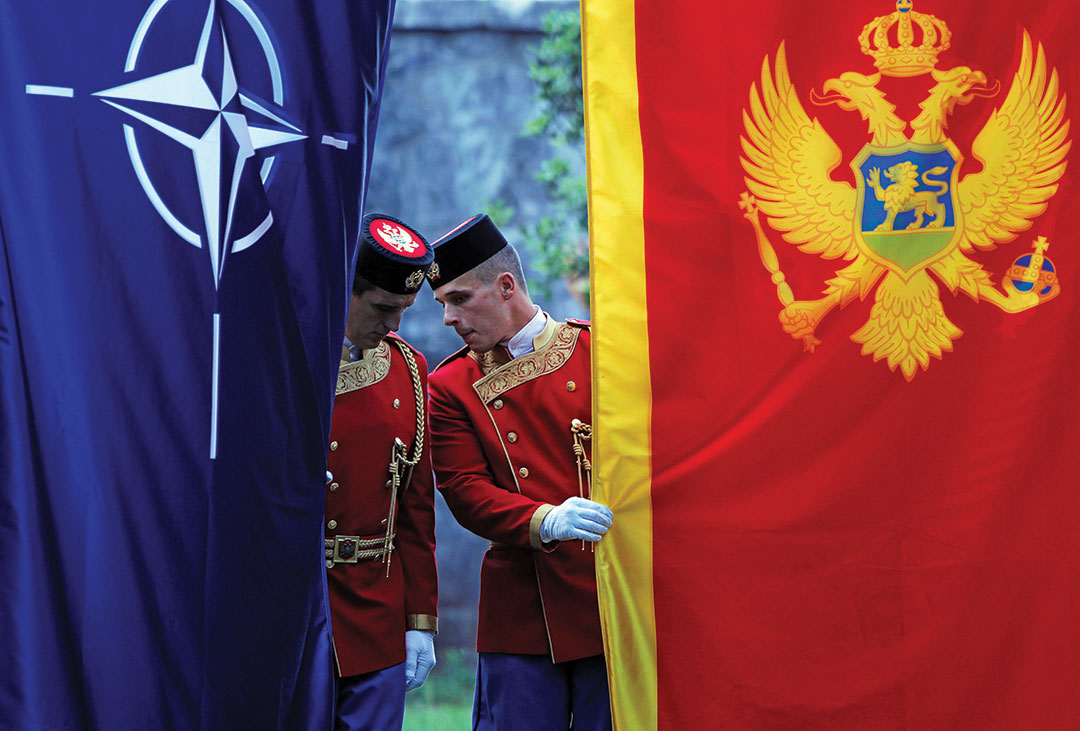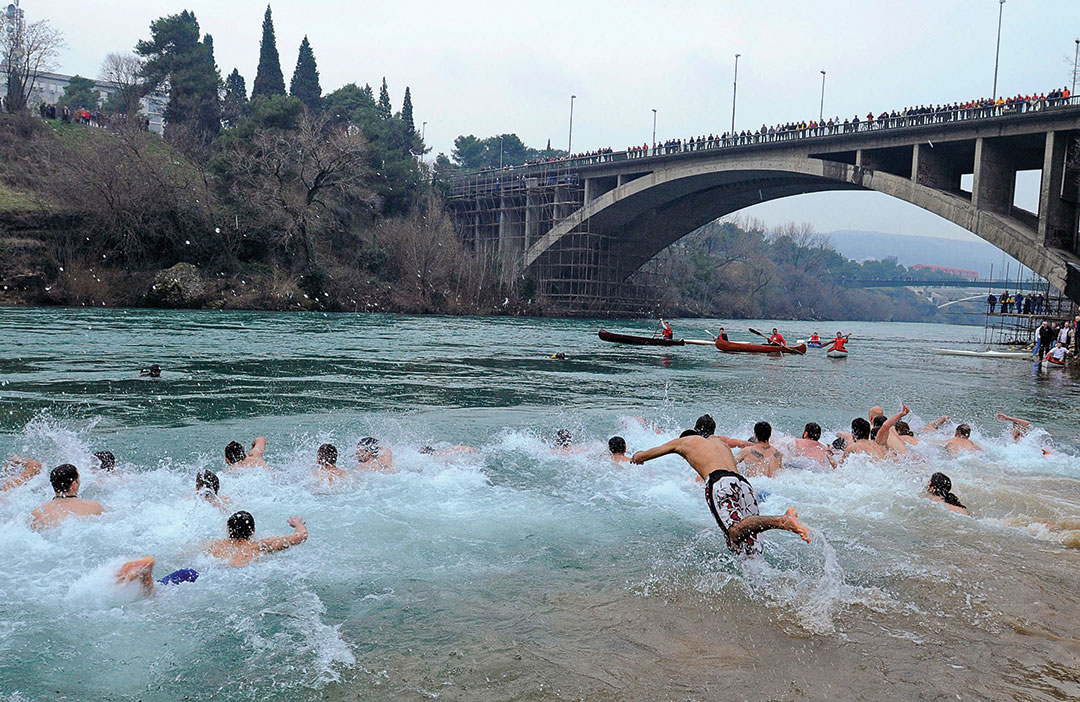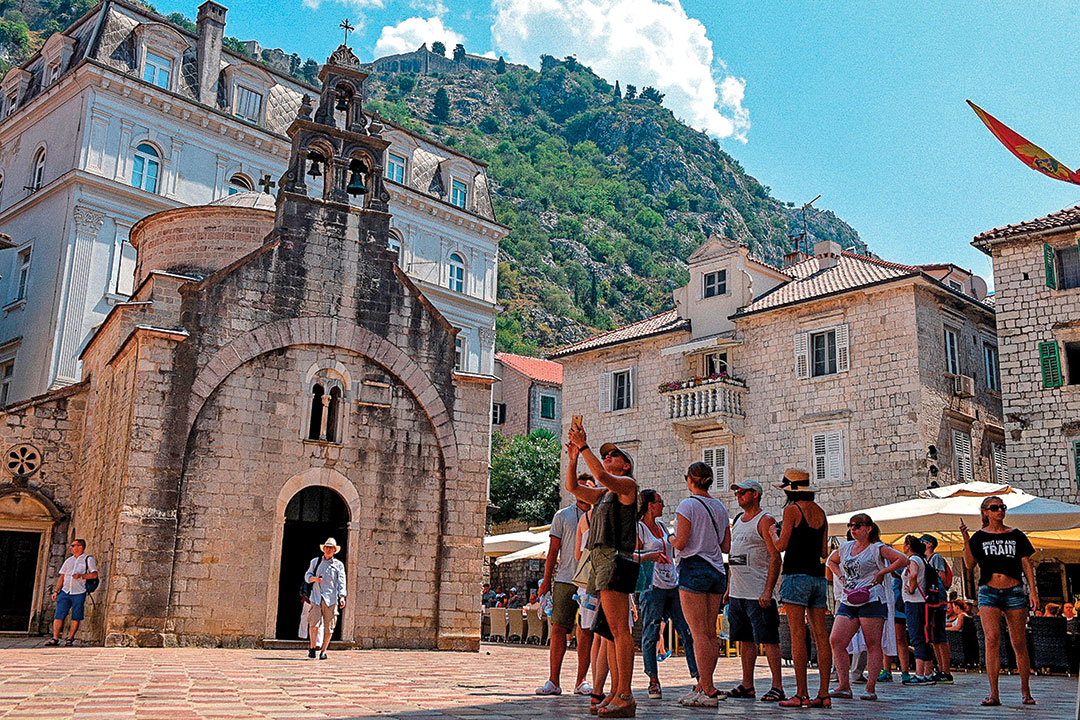False narratives defined the battle over NATO membership
By Marija Blagojevic, Advisor to the president of the Parliament of Montenegro
On June 5, 2017, Montenegro became the 29th member of NATO. Its accession was preceded by a campaign by the government and nongovernmental organizations that advocated membership, and by a campaign by those who opposed joining the Alliance. An important part of the anti-NATO campaign was reflected in narratives pushed by Russia that often found their way into mainstream media in Montenegro. The consequences of these narratives remain to this day.
Montenegro’s 2011 census (the country’s first after gaining independence) put the country’s population at 620,029. About 45% of the population declared themselves Montenegrins, while 29% said they were Serbs, 9% Bosniaks, 5% Albanians, 3% Muslims and less than 1% Croatian. The three major religious groups in the country are Orthodox Christians (72%) — who are divided between the Serbian Orthodox Church (SOC) and the Montenegrin Orthodox Church; Muslims (19%) and Catholics (3%). The remaining population belongs to other religious groups, are atheists/agnostics or did not declare a religious affiliation.

A brief history lesson is needed to fully understand the reasons behind Russia’s interference in Montenegro’s efforts to realize its most important foreign policy goal since gaining independence in 2006. The relationship between Montenegro and Russia goes back to the reign of Tsar Peter the Great. Ties between the two royal families were strong, as were economic and cultural relations. Russia was a patron of Montenegro and pushed the belief that the two countries were “Orthodox brothers” since the dominant population of Montenegro then and today is Orthodox Christian. Russia has a long history of pursuing its geopolitical goals in the Balkans. But Montenegro’s access to the Adriatic Sea has always added an incentive for Russia to interfere. Montenegro gained access to the Adriatic Sea after the Congress of Berlin in 1878, when its sovereignty was recognized by those countries that had not previously accepted it. Diplomatic relations with Russia continued when Montenegro became one of Yugoslavia’s federal units.
After the restoration of Montenegro’s statehood in 2006, the two countries established diplomatic relations. At that time, Montenegro clearly defined its entry into NATO and the European Union as its most important foreign policy priorities. This, however, did not imply being closed to investment by other stakeholders, and it was precisely this time after independence that saw major economic growth, especially in construction. Russia’s investment impact grew to become the most visible of any country’s.
In the 2018 policy brief “Assessing Russia’s Economic Footprint in Montenegro,” authors Milica Kovačević and Marija Mirjačić report that Russia accounted for one-seventh of the direct foreign investment in the 10 years after independence. They add that, based on data from the Central Bank of Montenegro, the total value of investments originating directly from Russia over this period was approximately 1.3 billion euros, or 31% of Montenegro’s gross domestic product. Since 2006, Russia has consistently been among the three leading investors in the country, along with Norway and Italy. The investment was especially visible in the field of tourism, Montenegro’s most important economic sector. According to the authors, the number of Russian tourists in Montenegro increased from 61,000 in 2006 to 316,000 in 2016 (about 25% of all tourists who visited that year).

After Montenegro defined EU and NATO integration as its main foreign policy objectives and began harmonizing its foreign policy with EU policy, Russia’s sphere of political influence narrowed considerably but remained present through certain opposition groups. The opposition’s impact grew after Russia’s 2014 annexation of Crimea, when Montenegro joined EU sanctions against Russia.
Montenegro has accused Russia of interfering in its 2016 parliamentary elections and of attempting to force a violent regime change. On the day of the election, a number of Serbian citizens were arrested and 14 people were indicted, including two Russian citizens, one of whom is a former member of Russian military intelligence and former deputy military attaché at the Russian Embassy in Poland. He was subsequently declared persona non grata and expelled from Poland on espionage charges. Others indicted were a police general from Serbia and a former commander of the Serbian Gendarmerie, as well as two leading politicians and members of the largest opposition group. The “coup attempt” had its epilogue in May 2019 when a Montenegrin court, after a yearlong trial broadcast on TV, convicted all the accused.
After Montenegro received a formal invitation from the Alliance on December 2, 2015, the pressure intensified. While Russia made public statements that could be interpreted as threatening, the real “war” was being waged in narratives spread through the media. The intention was to reduce public support.
The results of a poll in November 2015 from the Center for Democracy and Human Rights showed that 49.5% of the population supported NATO accession. The percentages changed over the years from 36% in 2008 to 50.5% in June 2016. It also varied within ethnic groups. A majority of Montenegrins, Albanians, Bosniaks and Muslims supported accession, while a majority of Serbs were against it.
Montenegro has several daily newspapers: Pobjeda and Dnevne novine, which are perceived as pro-government, and Vijesti and Dan, perceived as government critics. Russia’s state-run website Russia Beyond produces a monthly supplement distributed in the Balkans. There is daily news from Serbia available in Montenegro in publications such as Politika, Večernje novosti, Blic, Kurir and Danas.
The article “Pro-Russian Montenegrins Publish New Anti-Western Media” on the investigative news website Balkan Insight states that all Belgrade-based sites heavily reuse content produced in Russia by Russian media — specifically, the news agency Sputnik, the online outlet NewsFront and the website Russia Beyond. The article points out that Russian outlets appeared in the Balkans as Montenegro was negotiating its way toward NATO membership. They opened a headquarters in Belgrade and engaged co-contributors from Podgorica. Some analysts think Russia’s media strategy is to feed Montenegrin outlets with pro-Moscow news in Serbian, giving it more impact because it is republished in a local context. Several narratives were widely used, among them:
The ‘NATO aggressor’ narrative
This is the most common anti-NATO narrative used in Serbia and Montenegro, as well as the Republic of Srpska (a constituent part of Bosnia and Herzegovina), since the 1999 Kosovo conflict. NATO bombed then-Yugoslavia, of which Montenegro was a part. The airstrikes lasted 78 days. NATO countries tried to obtain authorization from the United Nations Security Council but were opposed by China and Russia, which indicated they would veto such a proposal. NATO launched a campaign without U.N. authorization, characterizing it as a humanitarian intervention. Yugoslavia described it as an illegal war of aggression against a sovereign country and a violation of international law.
The fact that the humanitarian intervention, which has often been described as legitimate but not legal, lacked U.N. approval is the core of the “aggressors” narrative, which is constantly repeated in pro-Russia media and was widely used in the pre-accession period.

Articles with headlines such as “Aggressor in peacemaker attire” would imply that Montenegrins should not join the “aggressors” and should never “forget what they did.” It was stated that NATO and its leader, the U.S., were and remain the “alpha and omega” of all evil in the world. The narrative argues that membership in NATO would be against the interests of the country’s most valuable ally, Russia.
There were also subnarratives, such as “NATO occupier” and “depleted uranium.” Both were intended to show the consequences of accession. The occupier narrative was used to suggest that sovereignty would be lost by joining NATO; that territorial integrity would be endangered. Articles about NATO bases being established in Montenegro were also part of this subnarrative. Headlines in the Serbian media included one that said, “Here’s where the NATO bases in Montenegro will be,” making it appear inevitable. Another headline said, “The Government of Montenegro releases NATO tax payments indicating the intention to build a base.” The idea was to make Montenegrins think that they would have no say in deciding their destiny after joining NATO. This narrative intentionally played on Montenegrin pride, because one of the main arguments of the independence movement in 2006 was that Montenegro should separate from Serbia so it could independently decide its own priorities and be responsible for its sovereignty and territorial integrity.
The depleted uranium subnarrative was also widespread and may have been the most sensitive because it relates to people’s health. Headlines such as “Montenegro and NATO: Drought of depleted uranium,” and “It’s enough to say — Bread, salt and uranium for enemies,” and “NATO bombs still kill Serbs,” and “NATO bombs perpetually threaten health,” and “Due to the depleted uranium in Kosovo, 300 KFOR soldiers have died,” aimed at convincing the public that there were harmful consequences from exposure to the remnants of the uranium-tipped munitions used by NATO in 1999. In these articles, attempts were made to correlate exposure to depleted uranium munitions with an increase in cancer patients in Serbia and in soldiers who served during the campaign. However, not a single article cites relevant research confirming such a correlation.
‘Russian military power’ narrative
A sampling of headlines that supported a “Russian military power” narrative include: “The billions are pouring: Here’s a new weapon the Russian army gets in 2015,” “A renaissance of the Russian military industry — nothing without a firm hand,” “NATO anxiety due to Russian intervention,” “Russian weapons and military equipment at a Paris fair,” “Russian army is getting hyper-weapons,” “Russian hunter Su-35 carries the title of the king of the sky,” “NATO generals: The Russian army is well-armed and very strong,” “Russian weapons for the 21st century,” and “Russia richer by two missiles: Zircon and Skif.” The narrative was meant to show that the Russian armed forces are inviolable and to cast doubt on NATO’s ability to protect Montenegro. One of the government’s main arguments for accession was precisely that, because of its size, Montenegro must be part of the collective NATO defense system. That’s why opposition articles portrayed Russia as possessing the most modern artillery, surface-to-air missiles, combat planes and helicopters. The narrative also portrayed Russia’s actions in Syria as heroic. Contributing to the success of this narrative was a lack of news about NATO military forces and the equipment they possess.
‘Superiority of Russian medicine’ narrative
This is one of the subtlest narratives. It is related to everyday life, and its purpose was to show Russian superiority in something that affects everybody. The intention was also to show a human side that is not exclusively tied to competing with others. This narrative succeeds because, in the former Yugoslavia, certain fields of medicine, such as ophthalmology, have traditionally been associated with Russian experts who are present in the region and considered very accomplished.
Some of the headlines related to this narrative include: “Express Diagnosis and Treatment without Medicines,” “Dr. Nikolai Nauar Nafi: Health Without Chemistry, Treatment Without Side Effects” and “Why Russian Alternative Medicine Is So Successful.” Contributing to this narrative were the penetration of Russian medical and cosmetic products into the Montenegrin market, accompanied by marketing that emphasized natural ingredients. This was intended to counter the perception that everything progressive and modern comes from the West and to show that Russia is out front of the West in this arena.
These narratives are current even today, although most of the articles referenced were written from 2015 to 2017. To understand the effects of these narratives, consider research by the National Institute of Democracy in Washington that was conducted in Montenegro, Bosnia and Herzegovina, Serbia and North Macedonia and published in early 2019, which among other things, includes citizens’ attitudes and media reporting on foreign influences.
The research shows that, even though Montenegro is a NATO member, 45% of its residents have a favorable opinion toward Russia, 41% have a favorable opinion toward China, 40% are favorable toward the EU, 29% toward the U.S. and 25% toward NATO. The respondents said their opinions were mostly influenced by media, as well as friends and family. When asked which state or international institution supports their country the most, the EU was mentioned by 45% of the respondents and Russia by 13%. A solid majority of 58% said the country should continue on its European path even if it means spoiling good relations with Russia. In relation to the narratives above, it is interesting that 47% found Russia’s military superior to NATO’s, 37% did not and 17% said they did not know.
When asked if the country would become a better place to live if it gave up EU integration and turned toward Russia, 43% responded that it would, while 46% said it would not and 11% didn’t know. Half of the respondents believe the country’s economic development is linked to Russia. When asked whether the country could reach its economic development goals if it chose Russia as its key trade and investment partner, 51% responded positively. However, 59% said the country would be able to reach its economic development goals if it chooses to maintain the EU as its key trade and investment partner.
When asked where they would seek medical treatment or surgery, 21% said Russia, the single biggest percentage of any country. Another 28% named a country in the EU, and 20% said the U.S. When asked whether they pay attention to the sources of the media they consume, 54% said they did not.
Of course, not all the survey results are the product of these narratives, but some are certainly concerning and show the impact that even subtle propaganda can have. The results show how important it is to clearly explain the benefits of NATO, for example, or any important goal, as well as the importance of deterring fake news.


Comments are closed.